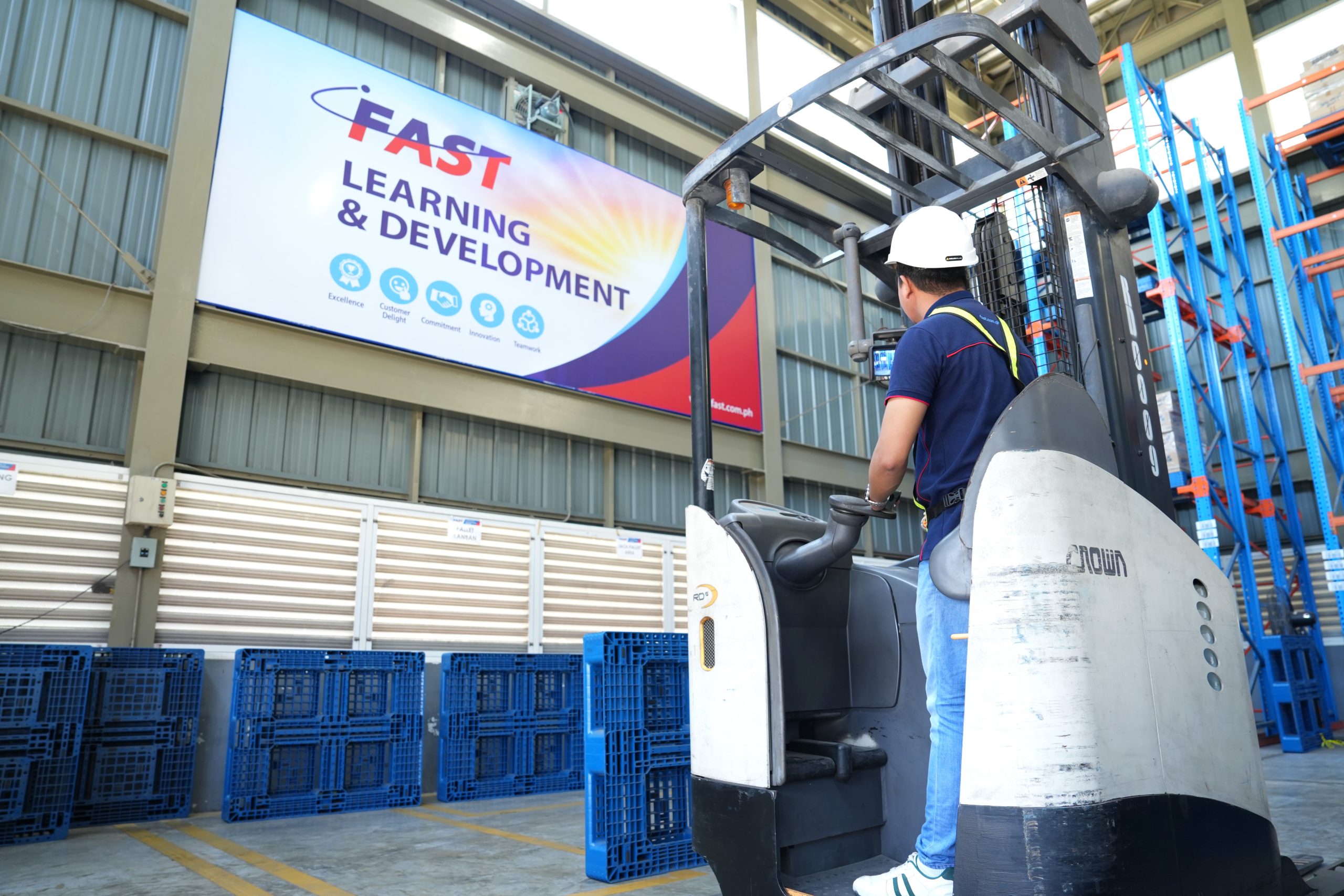
Supply chain management is a complex field that requires a diverse set of skills. It is essential for supply chain workers and professionals to continuously boost their competencies not only for job satisfaction and career progression but also to ensure seamless supply chain operations.
As global trade and e-commerce continue to expand, there is a growing demand for skilled supply chain workers and professionals. If you are a student aspiring to break into the field or a young professional seeking to accelerate your career growth, staying abreast of the critical skills one must possess in the supply chain industry is essential.
Navigating supply chain requires continuous learning and skill enhancement. Supply chain professionals at every career stage should therefore have a thorough understanding of the top skills needed to excel in their roles not only to gain a competitive edge but to fulfill customer demand efficiently.
FAST Logistics Group, the leading end-to-end logistics and distribution company in the Philippines, explores the important skills that should be acquired by supply chain professionals.
Importance of Supply Chain Skills
Every successful business needs competent supply chain managers and professionals, as they are responsible for ensuring that raw materials and goods flow seamlessly from production to the end consumer. They play crucial roles in all activities involved in supply chain performance, encompassing planning, sourcing, forecast demand, procurement, production, and warehouse and inventory management, among others. Here’s how companies benefit from skilled supply chain workers.
Optimizing Processes
Skilled supply chain professionals are indispensable to businesses because of their ability to optimize processes and improve profitability. They excel at finding the most efficient ways to move products from suppliers to manufacturers and, ultimately, to consumers. By streamlining operations, supply chain professionals help reduce costs, minimize wastage, and improve the delivery times of businesses.
Improving Customer Satisfaction
A well-managed supply chain leads to timely delivery of goods and services, which in turn boosts customer satisfaction. This is critical for businesses as satisfied customers are more likely to become repeat customers and recommend the company’s products or services.
Managing Risks and Relationships
Skilled supply chain professionals are adept at managing risks and cultivating good stakeholder relationships. They understand that unexpected events such as natural disasters or transportation delays can disrupt the entire supply chain and impact the company’s bottom line. To mitigate these risks, they develop contingency plans, leverage digital tools for real-time monitoring, and build strong relationships with suppliers and logistics partners. Skilled professionals in supply chain operations are needed to ensure that companies can effectively navigate unforeseen circumstances and meet customer demand.

The FAST Learning and Development Center in Cabuyao, Laguna, is the first-of-its-kind training center in the Philippines. Accredited by the Technical Education and Skills Development Authority, it offers various supply chain and logistics learning programs for all FAST employees and aspiring recruits.
Essential Skills for Supply Chain Workers
Supply chain demands a combination of technical expertise and soft skills. Here are the essential skills every supply chain manager and worker should possess to excel in their roles.
Inventory Management
Inventory management skills are crucial for supply chain workers because they ensure efficient control and optimization of a company’s inventory levels. By mastering inventory management, supply chain workers can minimize holding costs, reduce the risk of stockouts, and ensure that the right products are available when and where they are needed. This skill enables workers to maintain optimal inventory levels, improve cash flow, and ultimately enhance customer satisfaction.
Warehouse and Transportation Management
With warehouse management skills, workers can efficiently organize and manage inventory, optimize storage space, and ensure accurate order fulfillment. Likewise, supply chain workers with transportation management skills can effectively coordinate the movement of goods, select the most cost-effective transportation methods, and manage transportation networks to ensure timely delivery. It will also help businesses minimize costs and reduce potential disruptions.
Procurement
By acquiring procurement skills, supply chain workers can effectively negotiate with suppliers. It will empower them to ensure the best possible terms and prices for the goods and services procured. Knowing procurement processes also allows workers to contribute to an organization’s cost reduction, quality improvement, and overall supply chain efficiency.
Data Analysis
In the digital age, data analytics and machine learning are critical in optimizing supply chain operations. Big data and advanced analytics can be used to identify patterns, trends, and anomalies within the supply chain system. Data analysis also empowers professionals to make data-driven decisions across supply chain processes that help improve process optimization, strategic planning, cost reduction, demand forecasting, and risk management.
Digital Proficiency
Proficiency in digital tools and business intelligence applications such as Microsoft Excel or Tableau is essential for supply chain workers to remain competitive and meet the demands of modern supply chain management. These platforms empower workers to analyze and visualize data for increased supply chain visibility, efficiency, and resilience. Understanding how to leverage data analytics, predictive modeling, and digital tracking systems can position a supply chain professional as a valuable asset to any organization.
Analytical and Problem-Solving Skills
The ability to analyze data, interpret trends, forecast demand, and solve complex problems is critical in the supply chain sector. Professionals in supply chain technology must be capable of making data-driven decisions that optimize operations and mitigate risks. Developing strong analytical skills can involve hands-on experience with data analysis tools, pursuing relevant courses, or engaging in problem-solving exercises that simulate real-world supply chain challenges.

FAST utilizes a Learning Management System to boost employees’ technical proficiency across various areas. This online course program is meticulously designed and contains lessons on software applications and development, data analysis, and human resources, which FAST employees need to effectively manage teams and projects.
Communication Skills
Supply chain workers must be able to communicate effectively with colleagues, suppliers, and customers to ensure seamless coordination and collaboration throughout the entire supply chain process. They also need to possess strong negotiation abilities to secure the best terms with suppliers and to resolve any conflicts or issues that may arise. In addition, supply chain workers who can articulate ideas, present data, and convey strategies succinctly are likely to be more effective in supply chain leadership roles.
Customer Service Skills
The ultimate goal of supply chain management is to ensure consumer needs are met through timely delivery, product quality, and cost-effectiveness. As such, supply chain workers must have a customer service mindset that prioritizes the needs and preferences of clients. They must develop empathy, problem-solving skills, and effective communication skills to ensure customer satisfaction.
Time Management
Supply chain management involves coordinating multiple tasks, deadlines, and stakeholders. Excellent time management skills are crucial in ensuring the smooth flow of operations and meeting delivery timelines effectively. Various project management tools and software will help supply chain professionals create detailed schedules and prioritize tasks to improve their work.
Teamwork and Collaboration
Effective supply chain management requires collaboration across various departments, suppliers, and external partners. Hence, workers should be team players with strong interpersonal skills and the ability to manage teams to facilitate the achievement of common goals. They should also foster productive working relationships and collaborate effectively with stakeholders through relationship building skills and openness to different perspectives.
Sustainability and Ethical Consideration
Because of the increasing emphasis on corporate social responsibility and sustainability initiatives, supply chain workers should have a thorough understanding of supply chain practices. This includes familiarity with eco-friendly sourcing, waste reduction techniques, and ethical labor practices. Enhancing knowledge in sustainability will empower supply chain workers to spearhead initiatives aimed at creating greener supply chains.
Adaptability and Flexibility
Supply chain managers must be adaptable and ready to shift strategies in response to any market trends and changes and supply chain disruptions. Cultivating a mindset that embraces change, learns from challenges, and sees uncertainties as opportunities for growth can make workers indispensable in the supply chain sector.
Learning Mindset
Supply chain management keeps evolving, making lifelong learning essential for career progression. Professionals should be informed about industry trends, technological updates, and best practices through continuous education — whether through formal university programs, online courses, or professional development workshops. Networking with industry peers and joining professional associations can also provide insights and opportunities for growth.
By continuously developing and honing must-have skills for supply chain, workers can propel their supply chain careers forward. They can also contribute significantly to the overall success of organizations by driving efficiency, cost savings, and sustainable practices within their supply chain operations. Watch the video below to learn more.
Developing Must-Have Supply Chain Skills
As the supply chain industry continues to evolve, professionals can develop their skills to stay relevant and advance in their career paths in various ways. Here are some of them.
Formal Education
Pursuing a relevant degree program in supply chain management or logistics equips workers with a strong foundation and technical skills required in the supply chain industry. Formal education provides them with valuable knowledge in areas such as procurement, inventory control, operations management, and logistics technology. Some employers also prefer candidates with formal education, as it demonstrates a commitment to the profession and ensures that workers have the necessary knowledge and skills to excel in their roles.
Professional Certifications
Professional certifications are invaluable for supply chain workers as they provide formal recognition of their expertise and skills in the field. These certifications not only enhance their credibility but also demonstrate their commitment to professional development. Moreover, many employers prefer or require certifications when hiring or promoting supply chain professionals, making these credentials essential for career advancement and job opportunities.
Online Courses
Online courses provide supply chain workers with the opportunity to acquire new skills and knowledge about supply chain management at their own pace. It is an excellent way for supply chain workers to stay up-to-date with the latest industry trends and expand their skill set through interactive content and remote learning.
Practical Training
Gaining experience through on-the-job training such as internships and apprenticeships can help supply chain professionals and workers apply theoretical knowledge to real-world situations, understand the intricacies of supply chain processes, and develop critical problem-solving and decision-making skills. It also helps learners build their confidence, competence, and expertise, enabling them to make meaningful contributions to their organizations.
Acquiring Important Skills for Supply Chain Success
Supply chain professionals, especially those seeking career growth, must remain open to learning, embrace change, and integrate new technologies to maintain a competitive advantage in their field. The key to staying ahead in the fast-paced and competitive world of supply chain management lies in continuous education and adaptation to changing environments.
By actively seeking opportunities to learn, whether through formal education, professional development programs, online programs, or on-the-job experiences, professionals can boost their supply chain skills and advance their careers.
With over 50 years of industry leadership, FAST Logistics Group is the leading end-to-end logistics and distribution company that offers a comprehensive range of solutions. To learn more about our services, contact our Solutions Expert or visit http://linktr.ee/fastlogisticsph
Categories
-

FAST Ahead
Includes case studies and testimonials of our partners as well as other featurettes from industry experts
-

FAST Hacks
We simplify logistics terms and provide practical tips and solutions for the DIY in you
-

FAST Highlights
Know more about our history, various brands, achievements, and news updates
-

FAST Moments
Get to know the people of FAST, our employee programs, as well as our various ways of giving back to the community
-

FAST Solutions
Learn more about the various logistics solutions that we cater to and offer our clients, as well as tech innovations, and service facilities



